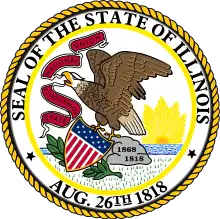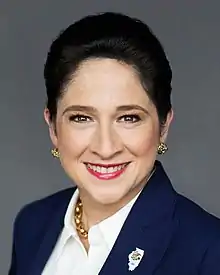Illinois Comptroller
The Comptroller of Illinois is a constitutional officer in the executive branch of government of the U.S. state of Illinois. Ten individuals have held the office of Comptroller since the enactment of the Illinois Constitution of 1970, replacing the prior office of Auditor of Public Accounts that was first created in 1799. The incumbent is Susana Mendoza, a Democrat.
| Comptroller of Illinois | |
|---|---|
 Seal of the State of Illinois | |
| Style |
|
| Seat | Illinois State Capitol Springfield, Illinois |
| Appointer | General election |
| Term length | Four years, no term limits |
| Inaugural holder | George W. Lindberg |
| Formation | December 15, 1970 |
| Salary | $135,669 (2016)[1] |
| Website | Official page |
Eligibility and term of office
The Comptroller is elected for a renewable four-year term during the quadrennial mid-term election. The Illinois Constitution provides that the Comptroller must, at the time of their election, be a United States citizen, at least 25 years old, and a resident of the state for at least 3 years preceding the election.[2]
Powers and duties
Article V, Section 17 of the Constitution of Illinois says the Comptroller: "shall maintain the State's central fiscal accounts, and order payments into and out of the funds held by the Treasurer."[2] In accordance with this mandate, the Comptroller is designated by law as the state's chief fiscal control officer and is responsible for the legal, efficient, and effective operations of state government.[3] As such, the Comptroller keeps and adjusts the statewide accounting system, signs paychecks or grants approval to electronic payments made by the state to its employees and creditors, monitors cash flow, prepares the state's annual comprehensive financial report, and provides monthly debt transparency reports to the General Assembly.[4] The Comptroller is also charged by statute with certain additional duties. In particular, the Comptroller supervises local government finances in Illinois, including reviewing local government financial data, investigating instances of waste and fraud in local governments, and publishing an annual report summarizing the revenues, expenditures, fund balance, and debt of units of local government throughout the state.[5] Moreover, the Comptroller regulates cemeteries under the Cemetery Care Act, and is charged with the fiduciary protection of cemetery care funds used for the care and maintenance of Illinois gravesites.[6]
Aside from their regular responsibilities, the Comptroller is fourth (behind the Lieutenant Governor, Attorney General, and Secretary of State, respectively) in the line of succession to the office of Governor of Illinois.[7][8]
Recent history
The late Judy Baar Topinka was a moderate Republican first elected in 2010 and subsequently re-elected in 2014 to a second four-year term as Comptroller. However, Topinka died unexpectedly in December 2014.[9] On December 19, Governor Pat Quinn appointed Jerry Stermer to succeed Topinka, to serve until January 12, 2015, when he was replaced by Leslie Munger, who was appointed by Quinn's successor as governor, Bruce Rauner.[10][11][12] Munger was then defeated by Susana Mendoza in the 2016 special election to fill the remainder of the term through 2018.
Merger proposals
Some legislators have perceived a redundancy overlap between the offices of Comptroller and Treasurer, and have therefore proposed constitutional amendments to merge the two offices and earn administrative savings. For example, HJRCA 12, considered by the Illinois General Assembly in the 2008-2009 session, would merge the office of Comptroller into the office of Treasurer.[13]
In 2011, Comptroller Topinka and the Treasurer, Dan Rutherford, introduced legislation to allow voters to decide whether the offices should be merged.[14] The legislation was opposed by Michael Madigan, Speaker of the Illinois House of Representatives, and did not become law.[15]
List of office holders
The following is an historic list of office holders for the Comptroller of Illinois and its preceding office, the Auditor of Public Accounts.[16][17]
Auditors of Public Accounts, Northwest Territory
- Rice Bullock (1799–1800)
Auditors of Public Accounts, Indiana Territory
- vacant (1801–1809)
Auditors of Public Accounts, Illinois Territory
- vacant (1809–1812)
| # | Name | Term | Political Party |
|---|---|---|---|
| 1 | H. H. Maxwell | 1812-1816 | |
| 2 | Daniel Pope Cook | 1816 | Democratic-Republican |
| 3 | Robert Blackwell | 1817 | |
| 4 | Elijah C. Berry | 1817–1818 | |
Auditors of Public Accounts, State of Illinois
| # | Name | Political Party | Term |
|---|---|---|---|
| 1 | Elijah C. Berry | Democratic | 1818–1831 |
| 2 | James T. B. Stapp | Democratic | 1831–1835 |
| 3 | Levi Davis | Whig | 1835–1841 |
| 4 | James Shields | Democratic | 1841–1843 |
| 5 | William L. D. Ewing | Democratic | 1843–1846 |
| 6 | Thomas Hayes Campbell | Democratic | 1846–1857 |
| 7 | Jesse K. Dubois | Republican | 1857–1864 |
| 8 | Orlin H. Miner | Republican | 1864–1869 |
| 9 | Charles E. Lippincott | Republican | 1869–1877 |
| 10 | Thomas B. Needles | Republican | 1877–1881 |
| 11 | Charles P. Swigart | Republican | 1881–1889 |
| 12 | Charles W. Pavey | Republican | 1889–1893 |
| 13 | David Gore | Democratic | 1893–1897 |
| 14 | James S. McCullough | Republican | 1897–1913 |
| 15 | James J. Brady | Democratic | 1913–1917 |
| 16 | Andrew Russell | Republican | 1917–1925 |
| 17 | Oscar Nelson | Republican | 1925–1933 |
| 18 | Edward J. Barrett | Democratic | 1933–1941 |
| 19 | Arthur C. Lueder | Republican | 1941–1949 |
| 20 | Benjamin O. Cooper | Democratic | 1949–1953 |
| 21 | Orville E. Hodge | Republican | 1953–1956 |
| 22 | Lloyd Morey | Republican | 1956–1957 |
| 23 | Elbert S. Smith | Republican | 1957–1961 |
| 24 | Michael J. Howlett | Democratic | 1961–1973 |
Comptrollers, State of Illinois
| # | Name | Political Party | Term |
|---|---|---|---|
| 1 | George W. Lindberg | Republican | 1973–1977 |
| 2 | Michael J. Bakalis | Democratic | 1977–1979 |
| 3 | Roland W. Burris | Democratic | 1979–1991 |
| 4 | Dawn Clark Netsch | Democratic | 1991–1995 |
| 5 | Loleta A. Didrickson | Republican | 1995–1999 |
| 6 | Dan Hynes | Democratic | 1999–2011 |
| 7 | Judy Baar Topinka | Republican | 2011–2014 |
| 8 | Jerry Stermer | Democratic | 2014–2015 |
| 9 | Leslie Munger | Republican | 2015–2016 |
| 10 | Susana Mendoza | Democratic | 2016–present |
References
- "SELECTED STATE ADMINISTRATIVE OFFICIALS: ANNUAL SALARIES" (PDF). The Council of State Governments. April 11, 2016. Archived from the original (PDF) on June 12, 2017. Retrieved March 24, 2017.
- Article V, Section 17 "Constitution of Illinois", accessed March 2, 2022.
- , What Is A Comptroller?, accessed February 4, 2022.
- , What Is A Comptroller, accessed February 4, 2022.
- "Local Government Division - Illinois Comptroller's Office". illinoiscomptroller.gov. Retrieved February 4, 2022.
- 760 ILCS 100/1 et seq., "Illinois Compiled Statutes", accessed April 12, 2008.
- "Constitution of the State of Illinois". Illinois General Assembly. Retrieved August 22, 2019.
- "Illinois Compiled Statutes 15 ILCS 5 — Governor Succession Act". Illinois General Assembly. Retrieved August 23, 2019.
- "Illinois Comptroller Judy Baar Topinka Dead at 70". NBC 5 Chicago, WMAQ. 10 December 2014. Retrieved 10 December 2014.
- "Quinn names longtime aide Stermer to succeed Topinka as comptroller". Chicago Tribune. Retrieved 19 December 2014.
- (January 5, 2015) - "Rauner to Appoint Leslie Munger as Next Illinois Comptroller". WGNtv.com. Retrieved January 12, 2015.
- "Newcomers, veterans sworn in as statewide officers". The State Journal-Register. Springfield, Illinois. Associated Press. January 12, 2015. Retrieved 2015-02-01.
- "House Joint Resolution - Constitutional Amendment 12". Retrieved March 8, 2009.
- McQueary, Kristen (December 31, 2011). "Move to Allow Vote to Merge Treasurer and Comptroller Jobs Stalls in House". The New York Times. Retrieved 11 January 2012.
- Wetterich, Chris (8 June 2011). "Madigan blocking merger of treasurer, comptroller's offices". The State Journal-Register. Retrieved 11 January 2012.
- History of the Office of Comptroller of Illinois Archived 2010-11-08 at the Wayback Machine
- Illinois Blue Book (1st ed.). Springfield: Secretary of State. 1908. p. 157. Retrieved 13 August 2018.
